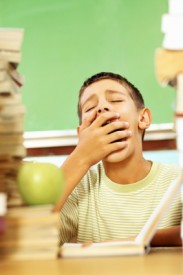
Sleep is essential to health and well-being as well as performance in work and play. Sleep and wake cycles appear to be regulated by the brain. And, although sleep allows for renewal of organs of body, it is also vital to cognitive skills in children and adults. Just a small amount of sleep deprivation affects performance for days thereafter.
There are two kinds of sleep that adults and children cycle through during the night, non-rapid eye movement sleep (NREMS) which accounts for about 80% of sleep and occurs more frequently during the first half of the night and rapid eye movement sleep (REMS) that accounts for the other 20% as is more prevalent during the second half of the night.. Rapid eye movement occurs when we dream as our eyes dart back and forth under our closed eyelids. Despite this complex nature of sleep performance during the day is dependent on the total number of hours of sleep. [i]
Children need much more sleep than adults and it is important that they have schedules and an environment that conducive to adequate sleep. There is a great deal of scientific evidence regarding the importance of sleep to the developing brain yet our nations’ children are not getting enough.
The National Sleep Foundation (NSF) conducted a Poll in 2004 to determine the amount of sleep our nations’ children are receiving and factors that are affecting the quantity and quality of sleep our children receive. [ii] In general they found that our nations’ children from birth through adolescence are sleep deprived: infants are getting one to two hours per day less sleep than experts recommend and toddlers through school aged children average from one half hour to two hours less per day.
Expert recommendations are provided below with U.S. averages in parentheses.
- 14-15 hours sleep per day for children aged 3-11 months ( U.S. infants average is 12.7)
- 12-14 hours of sleep a day for children aged 1-3 years (U.S. toddlers average 11.7)
- 11-13 hours per day for children aged 3-5 children (U.S. preschoolers average 10.4)
- 10-11 hours for 1st through 5th grades children (U.S. children average 9.5)
Children who do not get adequate sleep are more likely to develop problems getting to sleep and staying asleep at night. But most important, when children do not get adequate sleep experts report that, unlike adults who act lethargic during the day, children exhibit hyperactivity.
Two problems that experts say decrease the amount of sleep children get are consumption of caffeine during the day and having a television in the bedroom. The poll conducted by the National Sleep Foundation found that 43% of school-aged children, 30% of preschoolers and 18-20% of infants and toddlers have televisions in their rooms.
Another reason some children have trouble staying asleep is sleep apnea (brief stoppage of airflow at night that causes a child to awake). Doctors and parents may not suspect sleep is being affected by snoring because children do not exhibit the same behaviors as adults when they get insufficient sleep. Unlike adults suffering from sleep apnea who complain of fatigue and sleepiness, children may exhibit hyperactivity and aggressive behavior. So parents should tell their pediatricians if their child snores or wakes frequently during the night but also check for sleep deprivation when their child is showing increased activity or aggressive behavior that seems out of character for the child.
Related Reading:
The Imperative of Cultivating Healthy Adolescent Sleep Habits
Sleep: An Essential Ingredient for Memory Function
[i]Kruger, J.M., Rector, D.M., Roy, S., Van Dongen, H.P.A., Belenky, G. and Panksepp, J. (2008) Sleep as a fundamental property of neuronal assemblies. Nature Reveiws Neuroscience. 9 , 12, 910-919
[ii]The National Sleep Foundation website contains a paper which summarizes the 2004 poll. www.sleepfoundation.org.

